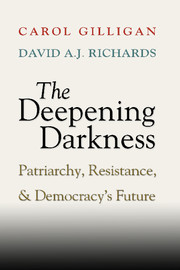Conclusion
Published online by Cambridge University Press: 01 September 2010
Summary
Toward the end of Macbeth, when Macduff learns that his wife and children have been slain, Malcolm enjoins him to “give sorrow words,” explaining that “The grief that does not speak/ Whispers the o'erfraught heart and bids it break.” Malcolm, the son of the king whom Macbeth murdered, has experienced such grief himself. As this extraordinary conversation continues, he urges Macduff to make “med'cines of our great revenge/ To cure this deadly grief” and “Dispute it like a man.” At which point, Macduff replies, “I shall do so,/ But I must also feel it as a man” (IV, iii).
In this most terrifying of Shakespeare's tragedies where “man” and “blood” are repeated words, the psychology of patriarchy is laid bare. Macbeth's “vaulting ambition” to be king is spurred by his wife's taunts to his manhood: “Art thou afeared,” she asks him, “wouldst thou … live a coward?” And when Macbeth responds, “I dare do all that may become a man./ Who dares do more is none,” she ups the ante, telling him, “When you durst do it, then you were a man;/ And to be more than what you were, you would/ Be so much more the man” (I, vii).
From the beginning, two constructions of manhood thus vie with each other in Shakespeare's tragedy: one that admits “the milk of human kindness” and one that rejects it as unmanly. “Bring forth men children only,” Macbeth tells his wife, “for thy undaunted mettle should compose/ Nothing but males.”
- Type
- Chapter
- Information
- The Deepening DarknessPatriarchy, Resistance, and Democracy's Future, pp. 264 - 268Publisher: Cambridge University PressPrint publication year: 2008



